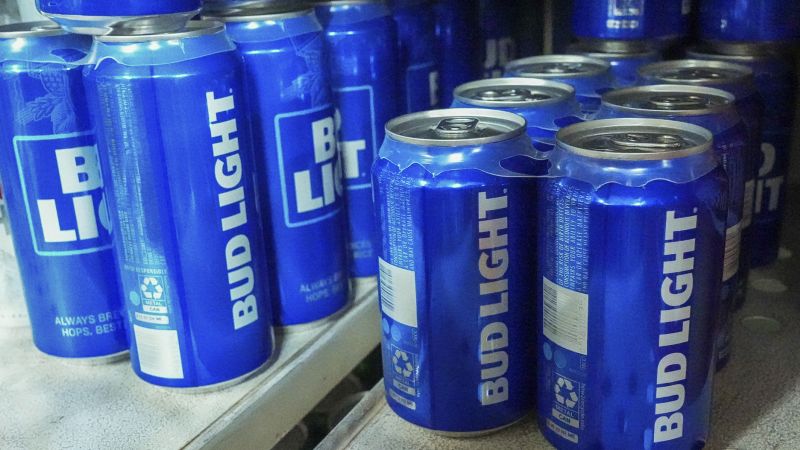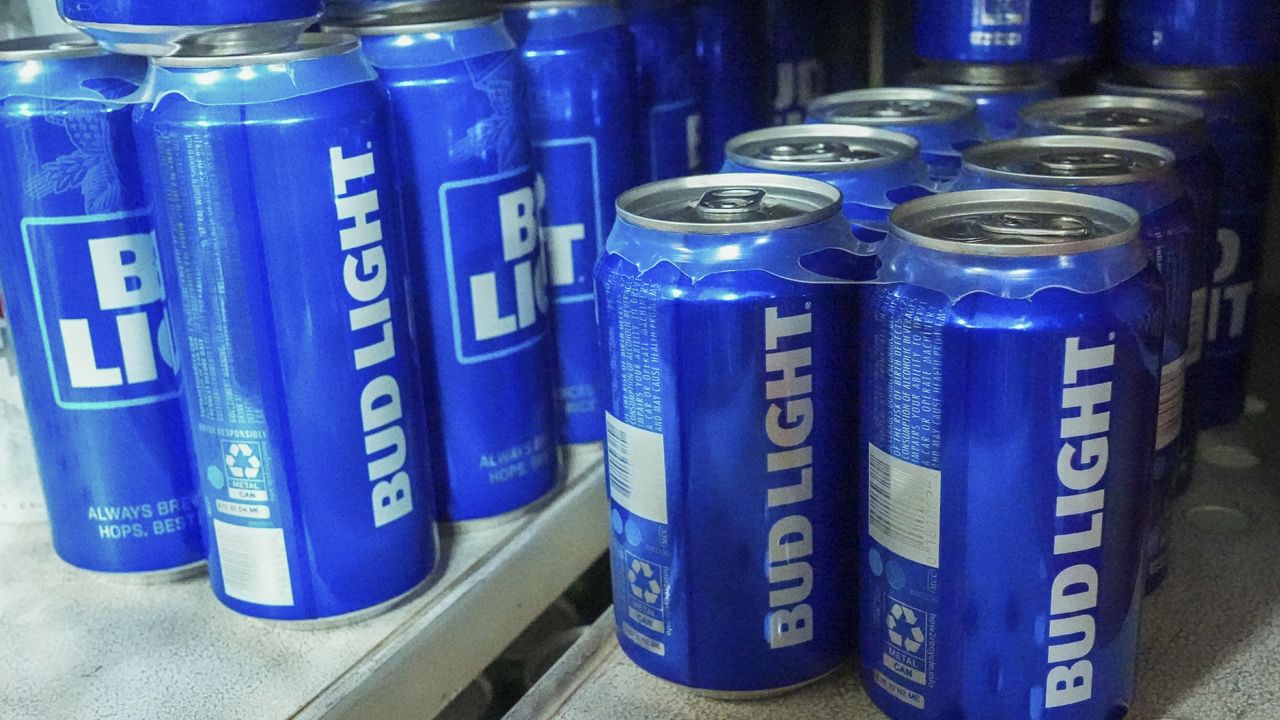
New York
CNN
—
Several Anheuser-Busch facilities received threats last week, a company spokesperson confirmed, following weeks of backlash against Bud Light because it sponsored two Instagram posts from a transgender woman.
“The safety of our employees is always our top priority,” the company spokesperson said in a statement to CNN. “We worked quickly with local law enforcement to ensure the security of our people and our facilities.”
The spokesperson did not share specific locations that had been threatened, but the Los Angeles police department told CNN that it responded to a bomb threat and conducted a sweep of an Anheuser-Busch brewery in the Van Nuys neighborhood last week.
A pair of Instagram posts by influencer Dylan Mulvaney sparked a mix of online backlash and support and became a target in conservative media. The company’s response, a vague pro-unity statement from the CEO that did not mention Mulvaney or the Instagram posts, has been criticized as weak, angering some trans advocates and failing to mollify some anti-trans critics.
But threats of physical violence have taken the incident to a dangerous new level, one that may alarm companies navigating their own marketing campaigns.
Bringing young customers into the fold is a business imperative for brands like Bud Light, which needs to stay relevant with the next generation in order to grow. An inclusive campaign and a partnership with an influencer like Mulvaney, who has 10.8 million followers on TikTok, can help achieve those goals. But often, moves to become more inclusive are not universally embraced, even as they are welcomed by supporters. When they lead to threats of violence, brands have to go on alert.
Anti-trans backlash hit Bud Light following an April 1 Instagram post from Mulvaney promoting the beer, in which she showed a custom can that Bud Light sent to her as a gift to mark a milestone in her transition. Mulvaney’s timeline shows one previous post that is also marked as a Bud Light partnership.

Mulvaney is among many social media personalities that Bud Light partners with, Anheuser-Busch said in a statement to CNN last week.
“Anheuser-Busch works with hundreds of influencers across our brands as one of many ways to authentically connect with audiences across various demographics,” according to a spokesperson. “From time to time we produce unique commemorative cans for fans and for brand influencers, like Dylan Mulvaney. This commemorative can was a gift to celebrate a personal milestone and is not for sale to the general public.”
A few days after the post was published, musician Kid Rock posted an Instagram video of himself shooting cases of Bud Light. “F**k Bud Light, F**k Anheuser-Busch,” he said. The video has garnered nearly 1.8 million views. Some conservatives called for a boycott.
Critics of the Instagram posts have pointed to Anheuser-Busch’s stock performance as an indication that the brand’s decision is bad for business. From March 31 to Wednesday, the company’s stock price fell about 1{21df340e03e388cc75c411746d1a214f72c176b221768b7ada42b4d751988996}, a relatively minor move. The broader stock market has gained about 1{21df340e03e388cc75c411746d1a214f72c176b221768b7ada42b4d751988996} in that period.
In fact, so far this year, the company’s stock is up nearly 11{21df340e03e388cc75c411746d1a214f72c176b221768b7ada42b4d751988996}. Anheuser-Busch
(BUD) is set to report its first-quarter financial results, including revenue, on May 4. Although analysts don’t expect any potential sales boycott or boost to make a dent in a large global brand like Bud Light, the company may be asked about it on its earnings call with Wall Street investors.
Still, brands don’t want boycotts, and they certainly don’t want threats.
“It’s a big thing to cause a drop in the stock price, a drop in sales,” said Andrew Gilman, founder and CEO of CommCore, a consulting group with expertise in crisis communication. But those things “will probably recover,” he noted. “It’s another thing if, in fact, your employees are threatened.”
The situation, including the backlash and threats, could have a chilling effect on Anheuser-Busch and other brands, he said.
“If I have a consumer-facing product in America right now, I have to look at this and say, ‘Okay, what lessons can we take from it.’ And it does make you a little bit more cautious about anything that could cause threats to your employees, and anything that would hurt your sales.”
From Gilman’s perspective, the negative reaction and stock movement is a sign that Bud Light made a misstep in pursuing the partnership.
Once threats move into the real world, companies need to adjust their crisis management strategies, noted Margaret Stewart, a certified Social Media Strategist for the National Institute for Social Media who also teaches communication at the University of North Florida’s communication school.
“In a circumstance like this, once the online events [present] in a different and escalated way offline, this now requires a transition of crisis response,” said Stewart.
More generally, she noted, the situation should serve as a reminder to brands that there are downsides to marketing on social media, where opinions expressed tend to be more polarized than in real life. “When we’re taking to the social platforms to engage, it’s usually because we’re engaging on topics, content, what have you … that we really like, or that we really dislike,” she said.
The backlash has, in turn, inspired some to pose while proudly holding a can of Bud Light as a show of support — even those who might not be expected to promote any type of beer. Democratic Congressman Ted Lieu of California posted to Twitter a photo of himself and others drinking Bud Light, and Florida state representative Angie Dixon, also a Democrat, shared in a Twitter post a photo of a can of Bud Light, writing “what a nice day to enjoy a can of @budlight.” Mulvaney’s fans posted words of support on her social platforms, as well.
Last week, Anheuser-Busch CEO Brendan Whitworth released a statement calling for unity.
“We never intended to be part of a discussion that divides people,” he said. “We are in the business of bringing people together over a beer.” He added that the company has “a proud history supporting our communities, military, first responders, sports fans and hard-working Americans everywhere.”
Gilman sees the message as an attempt to calm both sides. But it’s not clear whether it succeeded: Anti-trans critics of the Instagram posts wanted the CEO to apologize for Bud Light’s partnership with Mulvaney, while her supporters wanted an explicit defense of its limited partnership with the influencer, who is already part of a vulnerable community.
Transgender people are more than four times likely to be victims of violent crime than cisgender people, according to a study from the UCLA School of Law. Some of Mulvaney’s supporters are even calling for their own Budweiser boycott.
The backlash is not uncommon, said Hyunjin Seo, a professor at the University of Kansas’s journalism and communications school who teaches social media marketing.
“Many, many organizations have faced challenges and backlash regarding their social media campaigns,” Seo said.
Experts CNN spoke with previously noted that often, calls for a boycott don’t result in an actual boycott, and that controversies blow over, as was the case with Nike, which was the target of a boycott campaign when it featured Colin Kaepernick in an ad in 2018.
Seo sees Bud Light’s partnership with Mulvaney as aligned with its history of marketing to LGBTQ+ communities, which includes selling Bud Light in rainbow cans for Pride Month and partnering with groups like GLAAD and the National LGBT Chamber of Commerce.
“Its influencer marketing is consistent,” with this history, she said. “As a company, on social media you try to develop your social voice and brand identity. Not everyone is going to agree.”
— CNN’s Vanessa Yurkevich contributed to this report.






